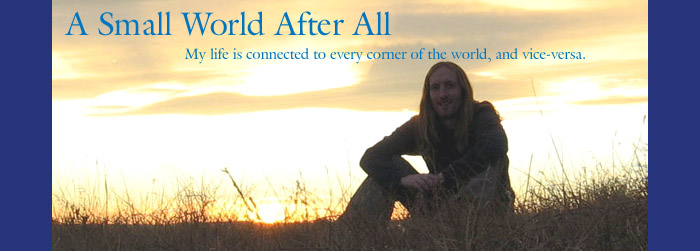I'm here because I care and I feel I have something to contribute to development. (and the thought of returning to Canada to engage in a job that doesn't directly contribute... sorta frightens me)
Not exactly sure, but if I start with the basics - I feel that everyone wants friends, health, knowledge and a decent income.
So this results in two fundamental things. 1 - power, 2 - ability to get power. Since you can get number 1 if you have number 2, then I guess even more fundamentally, development is allowing people the ability to get power.
What gives you power? Of course this depends on the situation. It could be your wealth, or it could be your age, gender, education, language, good looks (or other characteristics like strength, athleticism, musical talent, etc), your nationality, race, religion, location, caste or even your friends. In Canada the amount by which any of these can empower a person is different than it is in Zambia. Race, religion and age in Canada mean relatively little compared to what they mean in Zambia. Many of these are things you are born with, others you can obtain, but to obtain them you often need to have access to health care, education or a good job. Back to square one.
Wealth is the usually the easiest to translate into power regardless of the situation.
There are a few organizations here that are funded by Canadians/westerners and are hoping to address the issue of income generation. The magical formula which has worked in the past, goes something like this. Paul and his wife Samantha are farmers that live in a village, they have 2 hectares of land to grow corn, peanuts and vegetables along with a few chickens and cows. They don't have access to health care or good education for their kids, plus they have no savings. But, life is actually pretty good right now, there is food, shelter and you can hear laughter coming from the kids playing outside. This is the case until someone gets sick or there is a drought or a flood. They have very little capital to deal with problems.
It is a bit like a dating service, the organization searches for sellers and looks for buyers and then introduces the two. Of course its not so simple, they also have to facilitate the process and remove some of the risk that exists on both sides so that in the event that it doesn't work out, they haven't actually made things worse. And to make it even more difficult, the organization is on a contract with a donor who has given just enough money to get it right in 2 or 3 seasons.
Donor => pretty happy (seems to be good results, don't need to give any more money)
Org. => sorta happy (they had good paying jobs for 3 years)
Farmers => hardly happy (lot of effort into changing lives, few benefits seen)
Is there a way all three stakeholders can be really happy?
Sustainability.
What can be sustainable?
It's only a theory, but I think more organizations should just accept that they will become part of the relationship and they should try to make money doing it. If they aren't able to make money at it, then how do they expect a business to make money at it? Whether its transportation, personal contacts, food processing, access to inputs...whatever it is, an organization that employs educated people and is able to invest some money in the activity, is much better suited to turn a profit than a business that is already strapped for time, labour and investment capital. If the organization is successful, they can use the profits for funding a new project or they can streamline the operation and put it up for sale, and maybe even one of the employees will see that they can make a living from it?
Learning
If not, then something different should be done, but at least there are no false impressions about sustainability.
The current system is blind, no one knows how to measure success accurately and therefore it makes learning very difficult.
My partner organization is called Forest Fruits. It is a private enterprise which provides training, inputs, transportation, communication, processing, exporting and soon bottling. As a whole, it is profitable and therefore sustainable. It is buying from 6000 farmers who earn about $1 a day and just maybe the extra income allows them to save up a little for their future.
In essence, the 6000 farmers use to have no choice in where to sell there goods. Now, every year, Forest Fruits shows up and offers to buy their products. ie. A business now wants what they have, and to me, this is empowerment.









